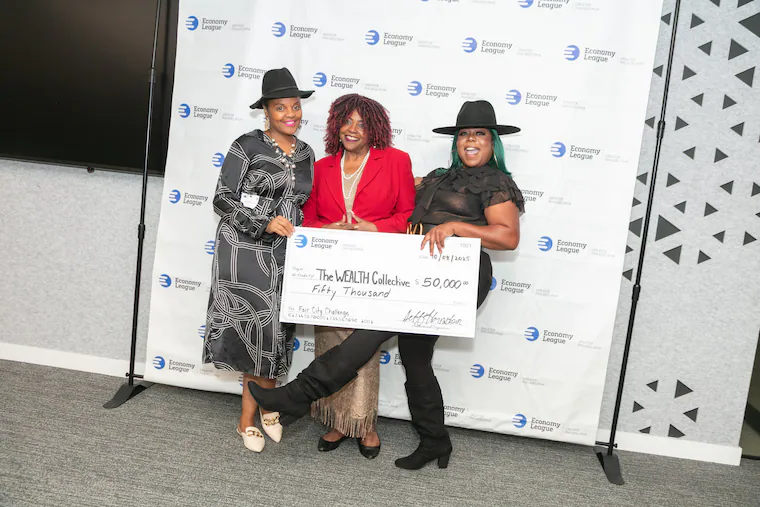
Almitra Tankersly was 12 years old when her parents’ West Philadelphia home was undervalued. It was her first experience with property appraisal bias.
Now, Tankersly is part of the WEALTH Collective, a team of Black women in real estate, banking, and finance that is fighting against appraisal bias in Philadelphia and beyond.
On Wednesday night, the Economy League of Greater Philadelphia awarded $50,000 to Tankersly, Clara Lyons-DeVaughn, and Vonetta Hawkins to support their work to eliminate home appraisal bias, which happens when Black homeowners’ properties or properties in predominately Black neighborhoods are valued less than comparable properties owned by white households or in primarily white neighborhoods.
The discrepancy strips home equity from Black households and widens racial wealth gaps. And it’s become too normalized, Lyons-DeVaughn said.
“We’re disrupting the status quo,” she said. “There’s gonna be a new normal. And that new normal includes having more equity and more wealth for communities of Black and brown people. We’re gonna take back our money, take back our wealth.”
The WEALTH Collective created an app that lets people upload their property appraisals and determine whether their properties may be undervalued. The platform flags bias and generates a report people can take to their lender to appeal incorrect appraisals.
The platform offers webinars about how homes are assigned value and about bias. Appraisal bias occurs because of factors such as conscious or unconscious racial bias in real estate industries, disinvestment in Black neighborhoods, and decades of racist and segregationist housing policies and systems.
The app also generates a scorecard for appraisers to let those with lower scores know they may need more education. The WEALTH Collective also plans to create a certification course for appraisers that it hopes will one day be required for professionals who want to work in the city.
In 2022, a task force convened by then-City Councilmember Cherelle Parker recommended making the appraisal process more transparent, educating homeowners and appraisers, and diversifying the appraisal profession to prevent bias.
“By awarding the WEALTH Collective with this year’s grand prize, we are supporting a replicable model that will support closing the racial wealth gap in Philadelphia and beyond,” Jeff Hornstein, executive director of the Economy League, said in a statement.
The contest
In 2023, the Economy League found that homeowners in Black and Latino neighborhoods in the city would have an additional $57 billion in property wealth if their homes had appreciated at the same rate as owners in majority-white neighborhoods over the course of seven decades.
“We did the research, and then we said, ‘What do we do about this?’” Hornstein said at the award ceremony Wednesday night. “We decided to put a challenge on the street earlier this year which basically said, ‘Give us a good idea for chipping away at this disgraceful wealth gap embodied in property values.’”
Proposals flowed in for the Fair City Challenge. The Economy League received about 75 applications for funding and then chose 14 teams to compete in a pitch competition in May. Four of those teams were named finalists and received $10,000 each and support to refine their ideas.
With the $50,000 prize, the WEALTH Collective plans to expand its pilot program by increasing the amount of appraisal data the app collects, driving policy changes, and reaching more people.
“The impact that we’re gonna make and are making right now currently is going to be enormous,” Hawkins said Wednesday. “The challenge said, ‘Will you impact the homeowner? Will you impact the neighborhood? Will you impact the city?’ What we’re doing right now impacts them all.”
Leslie Smallwood-Lewis, cofounder and chief operating officer of Mosaic Development Partners and one of the judges for the Fair City Challenge competition, praised the members of the WEALTH Collective for “their passion, supported by solid statistics, early proof of concept, and a clear path to scale up.”
TD Bank, Comcast, Independence Blue Cross, and the Philadelphia nonprofit NewCourtland, which builds and operates affordable housing, sponsored the award.
The other finalists
The Philadelphia Climate Equity Home Fund, led by Somalisa Sahoo, helps homeowners in historically disinvested neighborhoods finance energy-efficient home upgrades, such as improved insulation, solar panels, and new heating and cooling systems.
“It’s all about lowering bills and increasing home equity,” Sahoo said.
Raíces Capital Fund helps aspiring Latino real estate investors purchase and rehabilitate properties in disinvested neighborhoods. The project is led by Kersy Azocar, president and CEO of the Philadelphia nonprofit Greenline Access Capital, which supports the micro-businesses of historically disadvantaged groups.
Raíces Capital Fund assists graduates of Jumpstart Philly, a loan program that trains residents to be developers and tackle blight.
The third project is a collaboration between North Roots Orchard & Farm, founded by Garrison Hines to tackle food insecurity and reclaim vacant lots in North Philadelphia, and artist Brandy Fortune’s Bossed Up project to uplift communities through fashion and art.
Together, North Roots x Bossed Up is transforming vacant land in North Philadelphia using agriculture and public art through their Soil and Soul initiative. They are focused on revitalizing and bringing a community farm to Logan Triangle, land that’s sat vacant for decades.
“We blend regenerative farming with public art to transform blighted land into spaces of beauty, nourishment, and pride,” Fortune said.